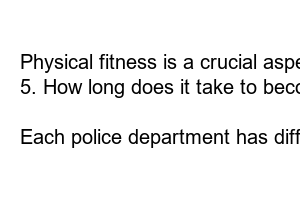경찰이 되는 방법
Title: A Step-by-Step Guide to Pursue Your Dream of Becoming a Police Officer
Introduction:
Are you passionate about upholding the law, ensuring public safety, and making a difference in your community? If so, a career in law enforcement as a police officer might be the perfect fit for you. In this blog post, we will provide you with a comprehensive guide on how to embark on this fulfilling journey.
1. Research the Role of a Police Officer:
Before diving into the process, it’s crucial to understand the responsibilities and challenges that come with being a police officer. *Policing is more than just fighting crime; it involves community engagement, conflict resolution, and enforcing laws to maintain order and safety.* Familiarize yourself with the ins and outs of the profession to determine if it aligns with your skills, values, and goals.
2. Meet the Basic Requirements:
To become a police officer, you must fulfill certain prerequisites, which typically include being at least 18 or 21 years of age, possessing a high school diploma or GED certificate, and having a valid driver’s license. Additionally, candidates must have a clean criminal record and be in good physical and mental health. It’s essential to review the specific eligibility criteria set by the police department you wish to join.
3. Obtain a Degree or Relevant Experience:
While a college degree is not always mandatory, it can significantly strengthen your candidacy. Pursuing a degree in criminal justice, law enforcement, or a related field provides you with a solid foundation of knowledge and skills required for the job. Alternatively, gaining relevant experience, such as participating in volunteer programs, internships, or joining a police auxiliary unit, can demonstrate your commitment and enhance your application.
4. Complete Police Academy Training:
Upon meeting the basic requirements, aspiring police officers are required to complete rigorous training at a certified police academy. This training covers a wide range of topics, including law, ethics, firearms handling, self-defense techniques, and emergency response. By undergoing this comprehensive training, candidates develop the necessary skills and knowledge to perform their duties effectively.
5. Pass the Police Entrance Exam:
Most police departments require candidates to pass a written entrance exam to assess their cognitive abilities, problem-solving skills, and comprehension of law enforcement concepts. Preparing for the exam by studying relevant materials and taking practice tests can significantly improve your chances of success.
6. Ace the Interview and Background Check:
Once you pass the entrance exam, you will likely proceed to a panel interview, during which your communication skills, problem-solving abilities, and ethical judgment will be evaluated. Furthermore, a thorough background check, including reference checks, fingerprinting, and a review of your financial history, will be conducted to ensure your suitability for the role.
7. Physical Fitness and Medical Evaluation:
Physical fitness is crucial for police officers, as the job often requires running, lifting, and maintaining a high level of endurance. To assess your fitness level, you will undergo various physical tests. Additionally, a medical examination will be conducted to ensure you are in good health and physically fit to perform the demanding responsibilities of a police officer.
Summary:
Becoming a police officer is a rewarding and challenging endeavor that requires dedication, commitment, and thorough preparation. By researching the role, meeting the requirements, completing training, and successfully passing the necessary exams and evaluations, you can set yourself on the path to a fulfilling law enforcement career. Remember that each police department may have specific guidelines, so it is important to research the requirements of your desired location. Good luck on your journey to becoming a police officer!
FAQs:
1. Can I become a police officer with a criminal record?
Each police department sets its own standards regarding criminal records. Generally, a clean criminal history is essential, but minor offenses may not automatically disqualify you. Contact your local police department to inquire about their specific criteria regarding criminal records.
2. Do I need a degree to become a police officer?
While a degree is not always mandatory, it can increase your competitiveness and provide a solid foundation of knowledge. However, gaining relevant experience or completing a police academy training program can also be beneficial.
3. Is police academy training paid?
In most cases, police academy training is a paid program. However, the specifics can vary depending on the department and location. It’s recommended to check with the police department you are interested in joining for further details.
4. Can I become a police officer if I am not in top physical shape?
Physical fitness is a crucial aspect of the job, as it ensures your ability to perform duties effectively. It is recommended to focus on improving your physical fitness before applying, as police departments typically have specific fitness requirements that must be met.
5. How long does it take to become a police officer?
The timeline to become a police officer can vary. Completing the necessary education, training, exams, and evaluations may take anywhere from several months to multiple years, depending on individual circumstances and the specific requirements of the department.
6. Can I become a police officer if I have tattoos?
Each police department has different rules regarding visible tattoos. Some departments may have strict guidelines, while others may allow tattoos as long as they are not offensive or visible while wearing the uniform. Contact your preferred police department to inquire about their tattoo policy.

